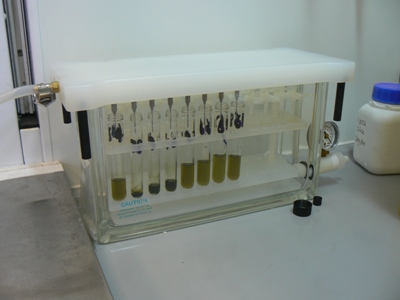 Biomarkers are distinct molecular compounds found in sediments that have a direct link with a specific biological source organism or process.
Biomarkers are distinct molecular compounds found in sediments that have a direct link with a specific biological source organism or process. Biomarkers are distinct molecular compounds found in sediments that have a direct link with a specific biological source organism or process.
Biomarkers are distinct molecular compounds found in sediments that have a direct link with a specific biological source organism or process.
Biomarkers are being examined from the Lake Suigetsu (SG06) sediment to provide information about changes in source inputs (including algae, bacteria, and higher plant inputs) and processes occurring within the lake and its catchment (e.g. changes in productivity, algal/bacterial populations, and soil in-wash). Compound-specific isotope analysis (δD) is being carried out on n-alkanoic acid compounds to provide more detailed information on past changes in hydrological conditions within the lake and catchment (e.g. precipitation, evaporation, and humidity).
NERC-funded biomarker and pollen analysis is being carried out at the School of Geography, Politics and Sociology, Newcastle University with a focus on the Late Glacial-Holocene section of the SG06 core, examining the timings and rates of change at decadal resolution across the Bølling onset, Younger Dryas and Holocene boundaries. The Lake Suigetsu sediments are also being examined at decadal resolution for evidence of the '8.2 ka event'.
We are also using near infra-red spectroscopy (NIRS) to reconstruct changes in the total organic content of the sediments.